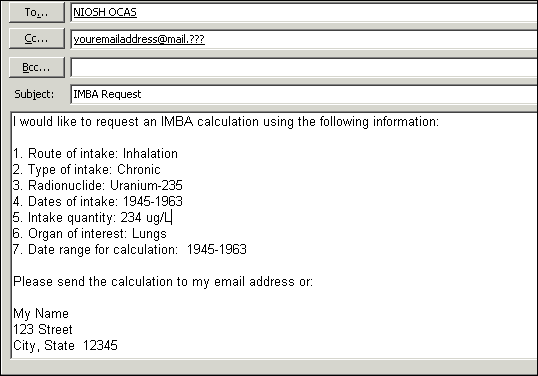Dose Reconstruction Software
Integrated Modules for Bioassay Analysis (IMBA)
Integrated Modules for Bioassay Analysis (IMBA) is a licensed computer software program that is used by NIOSH to calculate individual organ doses which result from the intake of radioactive material into the body. The program is based on internationally accepted models published by the International Commission on Radiological Protection (ICRP) and consists of several software modules created by the National Radiological Protection Board (NRPB) of the United Kingdom. These modules can be used to evaluate the biological intake, excretion, and dosimetry of a wide variety of radioactive isotopes.
Internal Dose and Internal Dosimetry Models
Internal dose is the radiation dose received as a result of radioactive materials entering the body through either inhalation, ingestion or absorption. Once inside the body, the radioactive material accumulates in specific organs or tissues and delivers a radiation dose to those organs or tissues. The extent to which an organ or tissue accumulates and clears radioactive material is highly dependent on the specific radioactive element or elements encountered in the workplace. This differs from external dose which is the radiation exposure received as a result of standing or working near radioactive material.
The internal dose to various organs is calculated using mathematical models of the biological behavior of radioactive elements taken into the human body. These models, published by the International Commission on Radiological Protection (ICRP), describe the behavior of material as it enters, metabolizes, and leaves the body. ICRP publication 301 contains the gastrointestinal tract model and publication 662 contains the lung model. These two models are connected to a biokinetic model that varies with each element. Most models of interest to the weapons program are contained in publications 673 and 694. The models for most other elements of interest are contained in publication 30.
Obtaining a copy of IMBA
IMBA contains licensed software modules. NIOSH has obtained a license for use of IMBA by DCAS and its contractors. More information on IMBA, including how to purchase the software, can be found on the IMBA Professional Plus Website.
Individual IMBA Requests and Questions
DCAS recognizes that many interested parties may not know how IMBA works or understand the scientific basis for these models. To help those who wish to understand more about internal dose calculations, DCAS has established a help desk to answer questions about IMBA. The toll free number for the help desk is 1-800-322-0111. In addition, specific requests for information on IMBA calculations can be made to NIOSH by sending an e-mail to our office at dcas@cdc.gov. In your email request, please provide a return address for where a response to the requested information or IMBA calculation can be sent. All NIOSH responses to requests for information on IMBA calculations will comply with the software licensing agreements and copyright law.
NIOSH is currently accepting one IMBA calculation request per email. The calculations will be performed using the IMBA Expert DCAS edition to calculate the dose to an organ or tissue of interest. The email request must specify the exact calculation you would like performed. The minimum information needed to process a request is listed below:
| Minimum Information Required for IMBA Request | Specific Examples of What Type of Information to Include in the Request |
|---|---|
| 1. Route of intake |
Inhalation, Ingestion, or Injection Note: If inhalation, include Solubility type Note: If ingestion, include the gastrointestinal absorption value |
| 2. Type of intake | Acute (short duration) or Chronic (long duration) |
| 3. Radionuclide | Uranium-234, Uranium-235, Plutonium-239, etc. |
| 4. Date of intake | Start and stop dates for chronic exposures or date of acute exposures |
| 5. Either a) the intake quantity or b) the bioassay quantity from which to calculate an intake. | The bioassay quantity should include the units (pCi/day, ug/L, etc.) and the date the sample was taken. |
| 6. Organ of Interest | Lungs, Liver, Kidneys, etc. |
| 7. The date range for which you want the annual doses to be calculated | From (year) to (year) |
A sample email request for an IMBA calculation is provided below:

Page References
1 International Commission on Radiological Protection (ICRP). 1979. Limits for Intakes of Radionuclides by Workers, Part 1. ICRP Publication 30, Annals of the ICRP 2(3/4). Pergamon Press, Oxford.
2 International Commission on Radiological Protection (ICRP). 1994. Human Respiratory Model for Radiological Protection. ICRP Publication 66, Annals of the ICRP 24(1-4). Elsevier Scientific Ltd., Oxford.
3 International Commission on Radiological Protection (ICRP). 1993. Age Dependent Doses to Members of the Public from Intakes of Radionuclides, Part 2. ICRP Publication 67, Annals of the ICRP 22(2/3). Pergamon Press, Oxford.
4 International Commission on Radiological Protection (ICRP). 1995. Age Dependent Doses to Members of the Public from Intakes of Radionuclides, Part 3: Ingestion Dose Coefficients. ICRP Publication 69, Annals of the ICRP 25(1). Elsevier Scientific Ltd., Oxford.
- Page last reviewed: September 28, 2015
- Page last updated: September 26, 2014
- Content source:
- National Institute for Occupational Safety and Health Division of Compensation Analysis and Support


 ShareCompartir
ShareCompartir